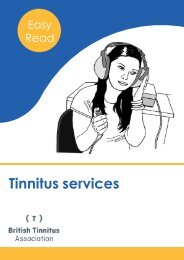Drugs and tinnitus Ver 2.2
Create successful ePaper yourself
Turn your PDF publications into a flip-book with our unique Google optimized e-Paper software.
is the stress of the illness rather than the drug used to<br />
treat the illness that triggers the <strong>tinnitus</strong>.<br />
Specific drugs & <strong>tinnitus</strong><br />
Nonetheless, there are a small number of drugs that<br />
do cause <strong>tinnitus</strong>. Many of these drugs are only given<br />
for serious illnesses where there is no alternative <strong>and</strong><br />
once again the BTA would like to stress that no-one<br />
should alter their medication without first discussing it<br />
with the prescribing doctor.<br />
Aspirin<br />
Aspirin in large doses has long been recognised as<br />
being able to cause <strong>tinnitus</strong> <strong>and</strong> indeed researchers<br />
use this property to deliberately produce <strong>tinnitus</strong> in<br />
animal experiments. In the normal small doses used to<br />
treat headaches or flu it is very unlikely that aspirin will<br />
cause <strong>tinnitus</strong>. Similarly the tiny doses of aspirin that<br />
many middle aged <strong>and</strong> elderly people take to prevent<br />
heart attacks or strokes are extremely unlikely to result<br />
in <strong>tinnitus</strong>.<br />
Aspirin used to be used in much larger doses to treat<br />
some rheumatological conditions <strong>and</strong> when given at<br />
these very high doses <strong>tinnitus</strong> sometimes did occur.<br />
However this effect was generally reversible: once<br />
the aspirin was stopped or the dosage reduced, the<br />
<strong>tinnitus</strong> disappeared. Such large doses of aspirin<br />
are almost never used nowadays as there are more<br />
effective, modern, alternative drugs available to treat<br />
these conditions.<br />
A very small number of people are unusually sensitive<br />
to aspirin <strong>and</strong> develop reversible <strong>tinnitus</strong> at very low<br />
doses. Clearly such people should avoid aspirin <strong>and</strong><br />
contact their doctor for advice regarding alternative<br />
drugs.<br />
Quinine<br />
Quinine <strong>and</strong> some of the other anti-malarial drugs<br />
can occasionally cause damage to the ear when<br />
given in high or prolonged doses, such as in the<br />
treatment of malaria. However, taken in low doses to<br />
prevent malaria or to relieve night cramps, this does<br />
not usually happen. In the rare cases where people<br />
on these low doses of quinine do report <strong>tinnitus</strong> it is<br />
temporary <strong>and</strong> ceases as soon as they discontinue the<br />
medication.<br />
Aminoglycoside antibiotics<br />
There is a small group of very specialised, powerful<br />
antibiotics that can be ototoxic – in other words<br />
they can damage the inner ear. This damage can<br />
cause hearing loss <strong>and</strong> a small number of the<br />
affected people develop <strong>tinnitus</strong> as a consequence<br />
of this hearing loss. This group is known as the<br />
aminoglycoside antibiotics <strong>and</strong> includes streptomycin<br />
<strong>and</strong> gentamicin. These drugs are not available as<br />
tablets, syrups or other oral preparations <strong>and</strong> are<br />
generally given by injection in hospital for severe, life<br />
threatening infections. Damage to the ear only occurs<br />
when the amount of the drug in the blood stream<br />
exceeds certain levels. For this reason the level is<br />
closely monitored by regular blood tests. However,<br />
there are certain conditions such as renal failure<br />
when the level of the drug can rise unpredictably <strong>and</strong><br />
allow dangerous levels to be reached. In these rare<br />
circumstances, <strong>tinnitus</strong> can occur.<br />
Aminoglycosides are also a component of some<br />
ear drops. These ear drops are only available on<br />
prescription: all the ear drops that can be purchased<br />
at a pharmacy without a prescription in the United<br />
Kingdom do not contain aminoglycosides. Although<br />
there is a theoretical risk, aminoglycoside ear drops do<br />
not generally cause ear damage <strong>and</strong> ear specialists<br />
are happy to prescribe them in reasonably short<br />
courses. However, any patient who is worried about<br />
taking such drops should discuss the matter with their<br />
doctor – there may be an alternative.<br />
Cytotoxic drugs<br />
The other main group of drugs which can damage<br />
the inner ear are the cytotoxic drugs used in treating<br />
cancer. Despite the power of such drugs, damage to<br />
the ear is surprisingly uncommon. The main group<br />
of cytotoxic drugs that can damage the ear is the<br />
group containing platinum, including cisplatin <strong>and</strong>,<br />
to a lesser extent, carboplatin <strong>and</strong> oxaliplatin. The<br />
specialist doctors who prescribe such drugs are very<br />
well aware of their potential side effects <strong>and</strong> usually<br />
discuss the matter in great detail prior to treatment.<br />
Whilst the BTA makes every attempt to ensure the accuracy <strong>and</strong> reliability of this information,<br />
it is not a substitute for medical advice. You should always see your GP/medical professional.


















